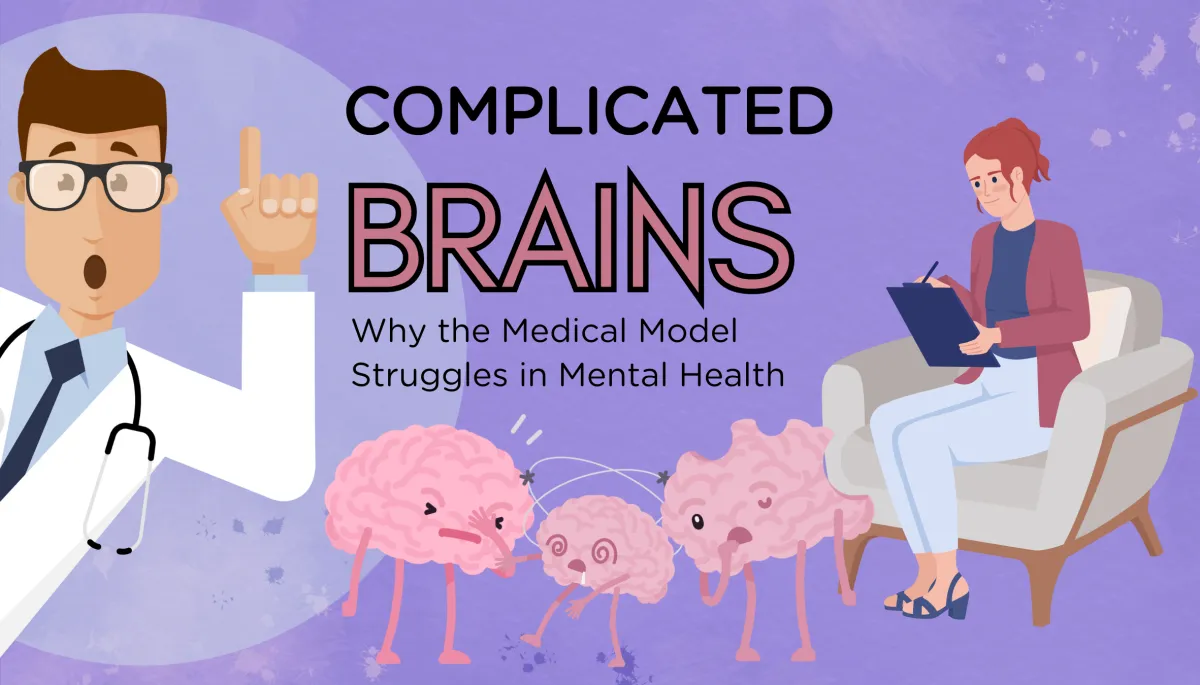General Inquiries: (587) 333-6349 - info@sanostate.com



Complicated Brain: Why the Medical Model Struggles in Mental Health
“ But here's the tricky part: the medical model isn't a good fit for our minds.”
Complicated Brains: Why the Medical Model Struggles in Mental Health
We often hear about the medical model, especially when it comes to taking care of our health. But what exactly is this model, and how does it affect mental health? Let's break it down in simple terms.
Understanding the Medical Model: Like Fixing a Car
Imagine how things play out when your car isn't running well. You might notice a few things wrong, so you take it to a mechanic. The mechanic listens to what you say, and then takes a look! They’ll pop open the hood, watch what is happening, listen for problems, and often use devices that help communicate with the vehicle's electronic system. Once they identify the issue, they can recommend an appropriate fix. This can include an estimate of costs and time and how long the fix will last. This way of thinking is what we call the medical model. It's about taking the time to find out the problem, then use proper tools to see what is causing it and apply the appropriate solutions.

Recently, I felt very ill. I visited the doctor, explained what I was feeling. He then checked my lungs, heart rate, blood pressure, and looked in my ears, and down my throat. After this assessment, he was quite confident on the diagnosis of strep throat, but still took a sample with a swab test to send to the laboratory for confirmation. From there, I was given antibiotics, and told to take them for several days, and that within 2-3 days I should be feeling better.
These are good examples of effective use of the medical model. Listening to the complaints (symptoms), then assessing through different methods and tools, diagnosing, and choosing the appropriate treatment giving instructions and timelines for recovery.
Fitting Psychology into the Medical Model: A Tricky Puzzle
Our minds are like giant puzzles with many pieces. Sometimes, these pieces don't fit together perfectly. We might feel sad, worried, or confused. This is where psychology comes in. We want to better understand our feelings, thoughts, and behaviors, just like the mechanic wants to understand your car's engine. So that we can know how to change the way we are thinking, feeling, or acting.

But here's the tricky part: the medical model isn't a good fit for our minds. We can check a car's engine with tools, or look at our bones with an x-ray, but how can we see and measure feelings and thoughts? This complicates things when trying to help someone with mental health struggles.
Diagnosis: More Than Just Labels
Imagine you're at the doctor's office because you're feeling really sad and overwhelmed. The doctor listens to you and asks about your feelings. They might compare your symptoms to a list of things they know about, like a checklist. This is how they give a diagnosis – like a label for what you're going through.

But our minds are much more complex than checklists. Sometimes, giving a label can be helpful. It lets you know you're not alone, and others might understand what you're feeling. But it can also oversimplify things. Everyone's puzzle of feelings is unique, and a label can not always capture everything you're going through.
Prognosis: The Crystal Ball Challenge
In the medical model, doctors often predict what will happen next – this is called prognosis. If you have a broken bone, they can usually tell when it'll heal. But with mental health, it's like trying to predict the weather. Our minds can change in unexpected ways.

Because everyone's mental puzzle is different, it's tough to say precisely what will happen. Some people might get better quickly, while others might need more time. This uncertainty can be frustrating, but it's the nature of our complex minds
Embracing the Complexity: A New Perspective
While the medical model is a helpful way to understand physical health, making it fit for mental health is a struggle. Our minds are unique and complicated, and our feelings and thoughts are not easily measured with tools or checklists. Instead of trying to force a perfect fit, it's essential to embrace the complexity.
Rather than view the body as a machine, with independent parts that need fixing when broken, we can view an individual’s life like a garden. A garden is a complex ecosystem that requires continuous care and attention. We might see some plants bloom while others struggle. And, if pests take over one area, the entire garden can be impacted. It’s also important who interacts with the garden, and how we feel when we are in it. Every garden is different, but each is exceptional.

Our approach to your mental health care includes meeting with one of our professionals that will get to know you and listen to what you are going through. Like the medical model, we then use different forms of testing including questionnaires, computerized cognitive testing, and importantly a qEEG brain scan to see how the brain is functioning. Once all of these tests are complete, we will meet with you to explain what we are seeing, how it might affect you, and what we plan to do.
Unlike the medical model, when you come to one of our clinics for treatment you may notice we might not give a diagnosis at all. This is because treatment is focused on getting you better and the growth of your garden. While we still care about the struggles you are experiencing, we want to have the flexibility to tailor a treatment just for you. We won’t get caught up on a single expected track that, although effective for someone else, might not be the best solution for you.
If this is an area where you could use support, please click HERE or call 587-333-6349 to connect. 💙
General Inquiries:
Our Locations:
Additional Resources:
About Us:
We strive for excellence in psychological treatment. We are committed to providing professional, caring, innovative, and research-based services.
© 2024 Sano State Taylored Psychology. All Rights Reserved.

